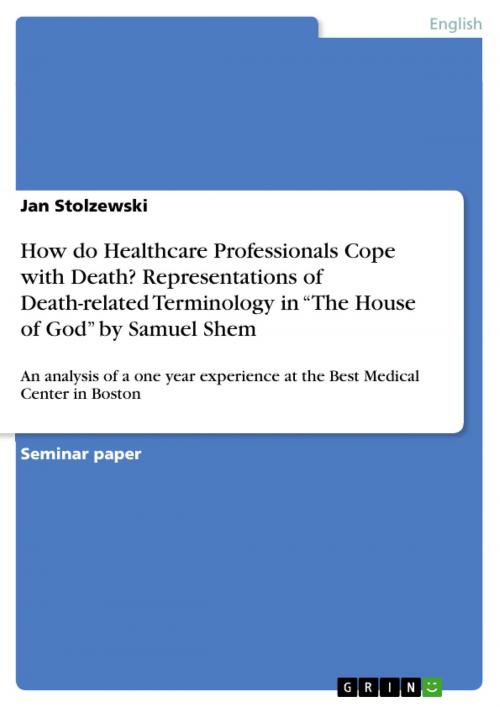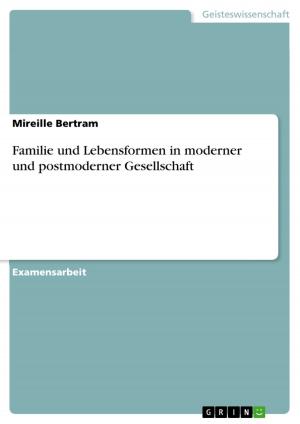How do Healthcare Professionals Cope with Death? Representations of Death-related Terminology in 'The House of God' by Samuel Shem
An analysis of a one year experience at the Best Medical Center in Boston
Nonfiction, Entertainment, Drama, Anthologies| Author: | Jan Stolzewski | ISBN: | 9783668012073 |
| Publisher: | GRIN Verlag | Publication: | July 7, 2015 |
| Imprint: | GRIN Verlag | Language: | English |
| Author: | Jan Stolzewski |
| ISBN: | 9783668012073 |
| Publisher: | GRIN Verlag |
| Publication: | July 7, 2015 |
| Imprint: | GRIN Verlag |
| Language: | English |
Seminar paper from the year 2013 in the subject English Language and Literature Studies - Linguistics, grade: 1,7, University of Münster (Englisches Seminar), course: Phraseology, language: English, abstract: In this paper, the representations of death and dying will be analyzed on the basis of authentic material. Specific terminology used by society when addressing this field of topic will be detected and evaluated. In the following paper, the novel 'The House of God' will be scanned for representations of that terminology through concordance software. The reflection of publicly used terminology within the novel will to a certain extend show the special relevance of death in the hospital setting and in how far death differs from normality in this field. Furthermore it will allow to draw conclusions on how the characters feel towards this topic and to which extend the novel depicts the hospital and the behavior of those who work in it as inhuman and deviating from what is regarded to be the social norm. Healthcare professionals working in the hospital setting are in the first line concerned with the medical condition of their patients. Moreover, they are trained to master and to alter nearly every possible medical condition they find a patient in and change it for the better. While the aim of every hospital treatment is to cure diseases and to treat injuries until the patients discharge from the institution, the death of a patient counteracts this aim. Where the condition of nearly every disease can be altered or, in the light of a growing number of chronic diseases at least be transformed to a resilient state, death is the ultimate end of these endeavors. The Oxford English Dictionary (OED) describes death as '...the act or fact of dying; the end of life; the final cessation of the vital functions [...] of an individual.' (Oxford English Dictionary, 2013a) Away from this objective description, the death of a patient, especially when it occurs suddenly and is not expected may be a burdensome event even for medical staff. Samuel Shems novel 'The House of God' is about the young intern Roy Bash who experiences his first year in the world of professional medicine at the Best Medical Center in Boston, MA. In the course of this year the protagonist experiences various events that revolve around living and dying of patients, colleagues and friends. Since these events take place in the setting of a hospital, they are meant to be dealt with professionally. The way how death is depicted, how it is reflected in the language of the professionals' at Best Medical Center may differ from the way 'the outside world', the rest of society deals with this topic.
Seminar paper from the year 2013 in the subject English Language and Literature Studies - Linguistics, grade: 1,7, University of Münster (Englisches Seminar), course: Phraseology, language: English, abstract: In this paper, the representations of death and dying will be analyzed on the basis of authentic material. Specific terminology used by society when addressing this field of topic will be detected and evaluated. In the following paper, the novel 'The House of God' will be scanned for representations of that terminology through concordance software. The reflection of publicly used terminology within the novel will to a certain extend show the special relevance of death in the hospital setting and in how far death differs from normality in this field. Furthermore it will allow to draw conclusions on how the characters feel towards this topic and to which extend the novel depicts the hospital and the behavior of those who work in it as inhuman and deviating from what is regarded to be the social norm. Healthcare professionals working in the hospital setting are in the first line concerned with the medical condition of their patients. Moreover, they are trained to master and to alter nearly every possible medical condition they find a patient in and change it for the better. While the aim of every hospital treatment is to cure diseases and to treat injuries until the patients discharge from the institution, the death of a patient counteracts this aim. Where the condition of nearly every disease can be altered or, in the light of a growing number of chronic diseases at least be transformed to a resilient state, death is the ultimate end of these endeavors. The Oxford English Dictionary (OED) describes death as '...the act or fact of dying; the end of life; the final cessation of the vital functions [...] of an individual.' (Oxford English Dictionary, 2013a) Away from this objective description, the death of a patient, especially when it occurs suddenly and is not expected may be a burdensome event even for medical staff. Samuel Shems novel 'The House of God' is about the young intern Roy Bash who experiences his first year in the world of professional medicine at the Best Medical Center in Boston, MA. In the course of this year the protagonist experiences various events that revolve around living and dying of patients, colleagues and friends. Since these events take place in the setting of a hospital, they are meant to be dealt with professionally. The way how death is depicted, how it is reflected in the language of the professionals' at Best Medical Center may differ from the way 'the outside world', the rest of society deals with this topic.















